Last updated: 08.10.2025
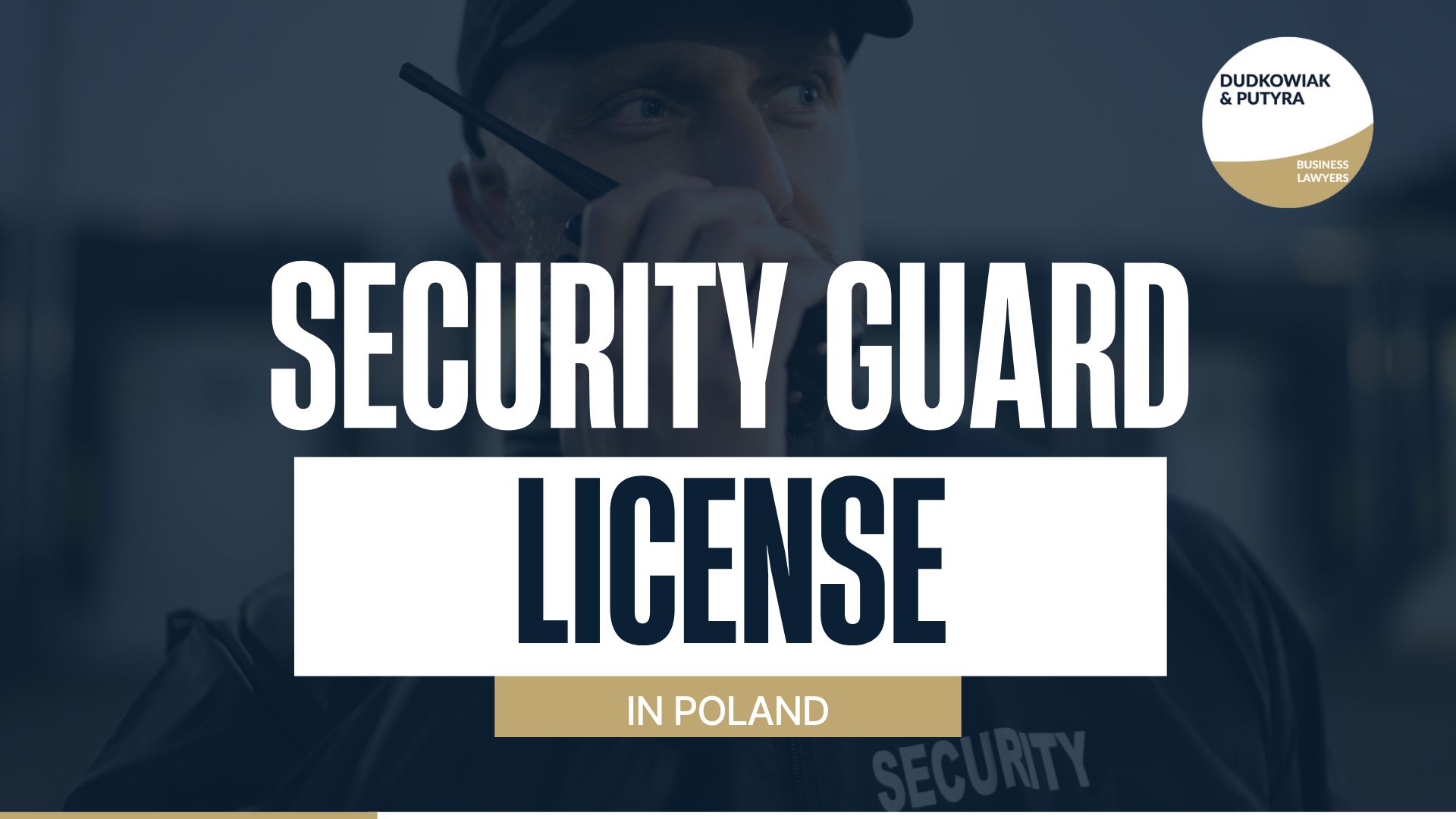
Act on the Protection of Persons and Property in Poland
In an era of growing threats, ensuring effective protection of property and public safety is becoming a priority.
The Act on the Protection of Persons and Property provides the legal basis that defines the rules and obligations of entities responsible for security, setting standards for their operations. It provides a legal framework for the safe and professional provision of personal and property security services, requiring businesses to obtain the appropriate licenses through a formal application process.
Thanks to our experience in the field of security law, we offer comprehensive support that allows our clients to operate confidently and in accordance with applicable regulations.
Below are the issues that we believe are key from the perspective of the Act on the Protection of Persons and Property.
Key Provisions of the Act on the Protection of Persons and Property in Poland
- identification of areas, facilities, and equipment subject to mandatory protection;
- definition of the rules for conducting business activities in the field of personal and property protection services;
- presentation of the required education, training, and certified qualifications of security personnel
- definition of the rules for the creation and operation of internal security services;
- regulation of supervision over the functioning of personal and property protection;
- definition of the rules for the protection of transported weapons, ammunition, explosives, armaments, military devices, and equipment
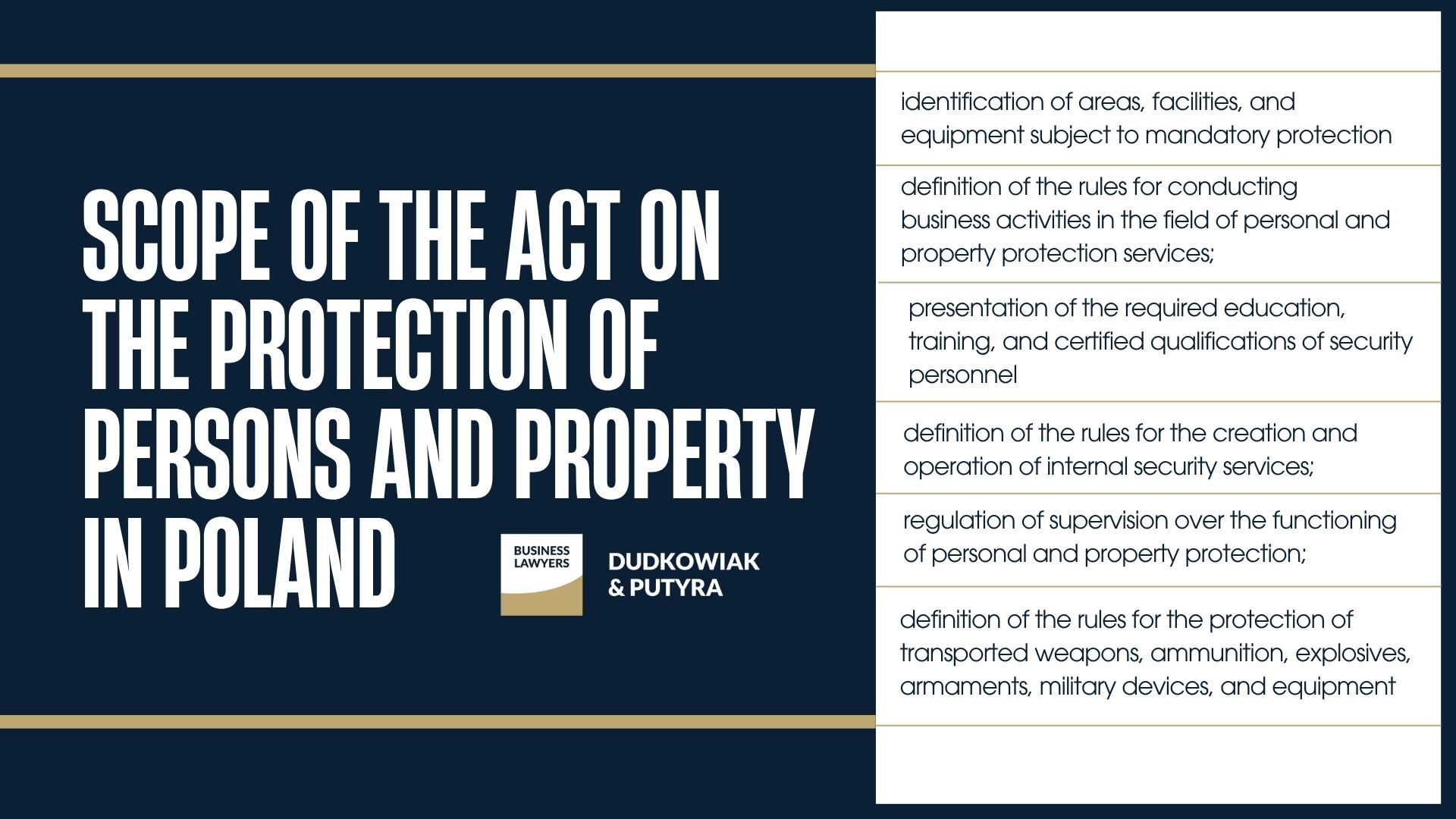
Mandatory Protection in Poland: What Facilities and Areas Must Be Secured?
Mandatory protection covers, in particular, areas, facilities, and equipment related to:
- national defense (special production facilities and facilities where scientific research or design work is carried out in the field of such production, facilities producing, repairing, and storing weapons, military equipment, and devices, strategic reserve warehouses);
- protection of the economic interests of the state (plants directly related to the extraction of mineral resources of strategic importance to the state, seaports and airports, banks money order transport, energy infrastructure);
- public safety (plants, access-controlled facilities, and equipment that are essential to the functioning of urban agglomerations, the destruction or damage of which may pose a threat to human life and health and the environment, in particular power plants and heating plants, water intakes, waterworks, and sewage treatment plants); facilities that use, produce, or store significant amounts of nuclear materials, radioactive sources and waste, toxic, narcotic, explosive, or chemical materials with high flammability or explosiveness, fuel pipelines, power and telecommunications lines, dams and locks, and other facilities located in open areas, the destruction or damage of which may pose a threat to human life or health, the environment, or cause serious material losses);
- protection of important state interests (plants with unique economic production, telecommunications, postal, television, and radio facilities and equipment, museums and other facilities where national cultural assets are stored, state archives);
- at the same time, facilities, including buildings, equipment, installations, and services included in the uniform list of facilities, installations, equipment, and services that are part of critical infrastructure;
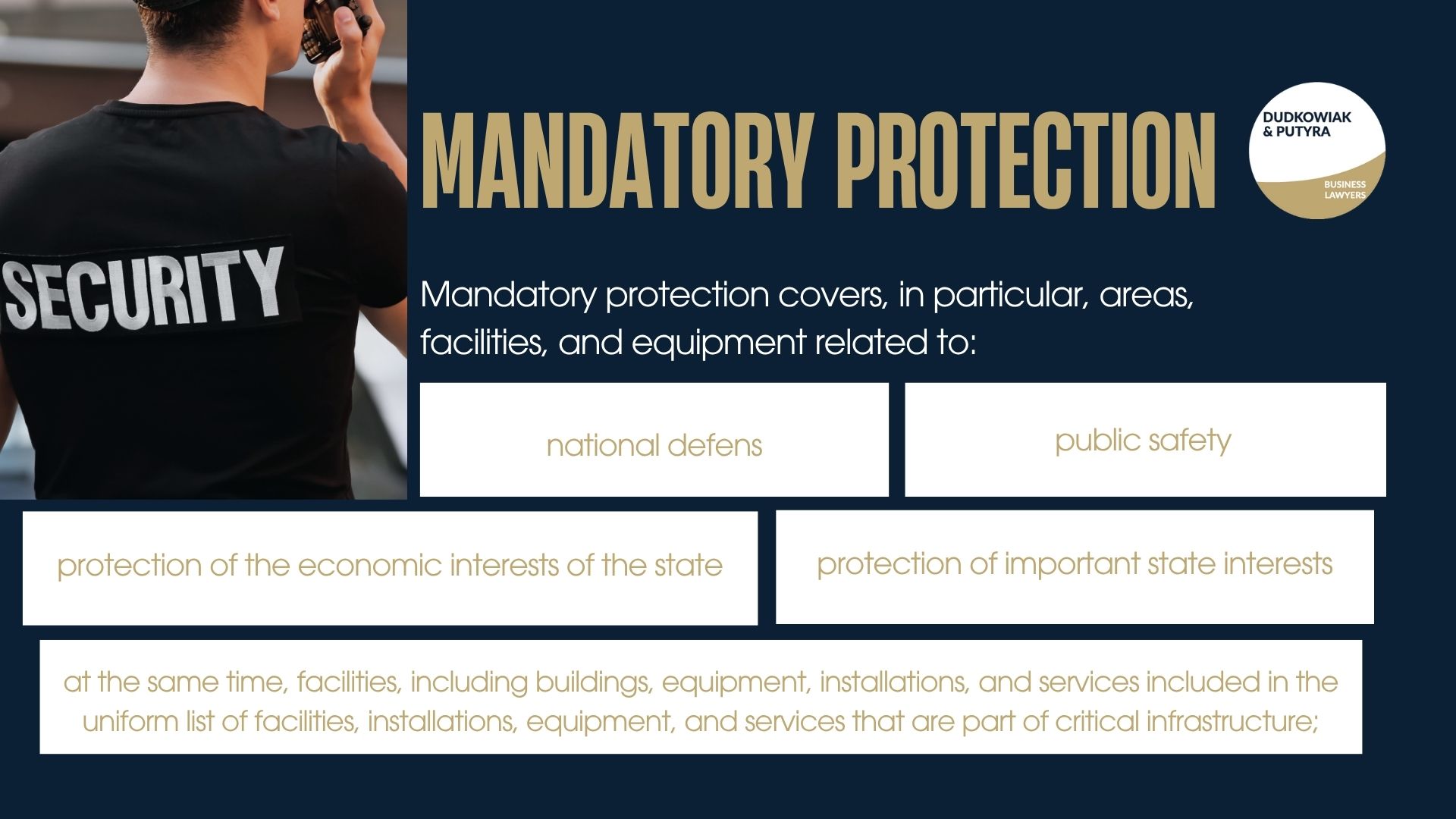
In order for a facility to be considered subject to mandatory protection, it must be designated by the appropriate authority.
The above list is open-ended, which means that the areas, facilities, and equipment listed therein are not the only ones subject to mandatory protection. The possibility that a specific area, facility, or equipment may be classified into one of the above categories due to its significant role cannot be ruled out.
The list is drawn up by the
- President of the National Bank of Poland,
- the National Broadcasting Council,
- ministers,
- heads of central offices,
- and then sent to provincial governors, who keep records of facilities, areas, and equipment subject to mandatory protection and located within the territory of a given province.
Forms of Protection: Physical Security vs. Technical Security
Under the Act on the Protection of Persons and Property, mandatory protection of specific categories of facilities, areas, and equipment is carried out in two ways, through:
- direct physical protection. permanent or ad hoc protection, protection consisting of constant monitoring of signals transmitted, collected, and processed in electronic devices and alarm systems, and protection consisting of the escorting of cash and other valuable or dangerous items. Direct physical protection is based on a personal element.
- appropriate technical security measures. Technical security measures include both electronic security measures, such as alarms, and mechanical security measures, such as anti-burglary grilles and locks. At the same time, the provision of protection through technical security measures also involves the installation, operation, maintenance, and repair of the above devices.
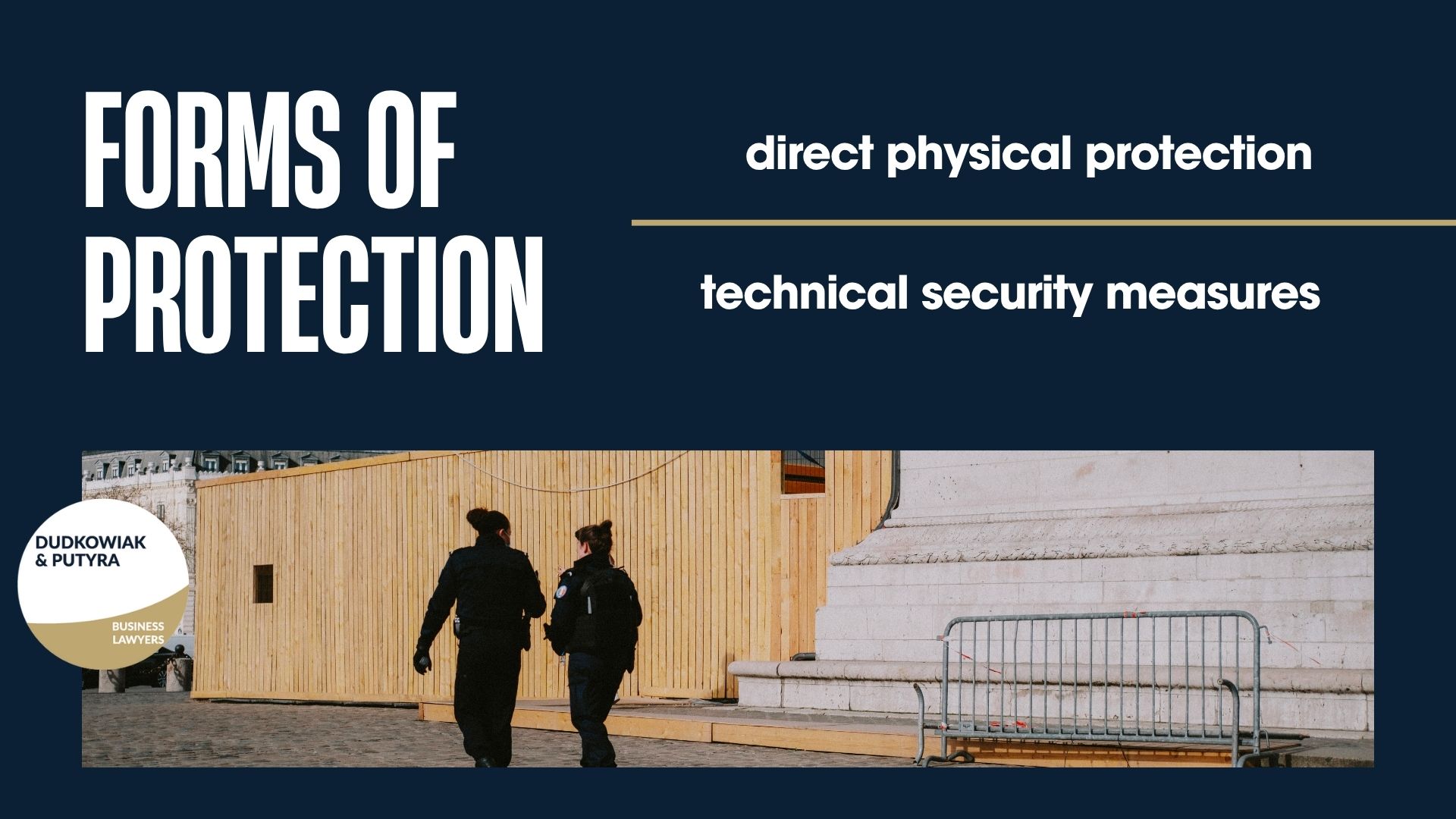
Conducting Security Business in Poland: License Requirements
A key element in conducting business activity in the field of personal and property protection services is obtaining the appropriate license, which specifies the scope and form of service provision. A license is understood as an authorization to perform a given activity in the field of business activity in question. In order to obtain a license, specific conditions must be met.
Who Grants the Security Guard License in Poland?
The department responsible is the Minister of Internal Affairs, acting with input from the provincial police.
The Minister of Internal Affairs and Administration, as the licensing authority, may specify in the license specific conditions for conducting the economic activity covered by the license, and is obliged to provide each interested entrepreneur with detailed information on the content of these conditions immediately after initiating the license granting procedure.
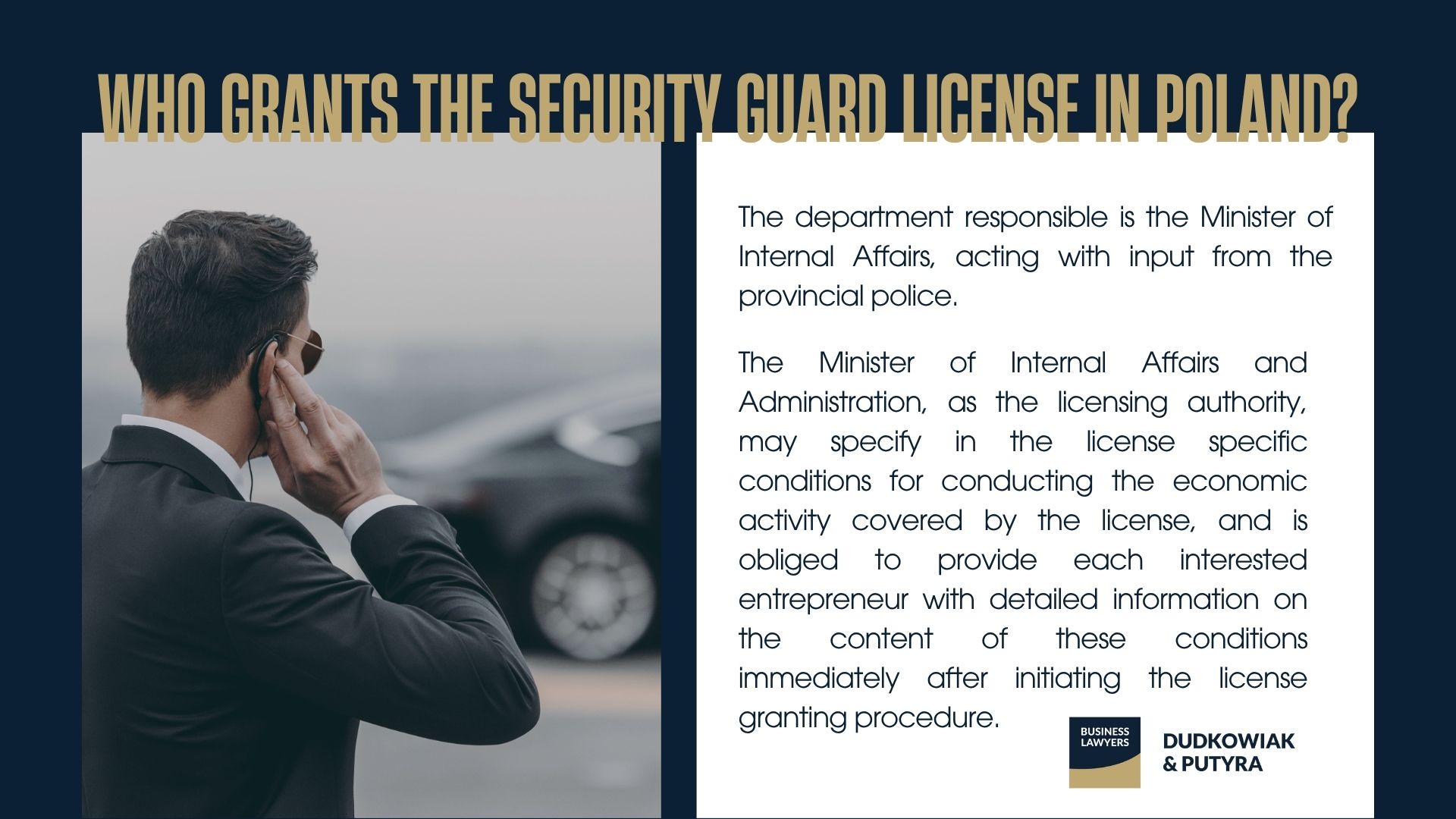
How to obtain a Security Guard License in Poland?
A security guard license in Poland is issued upon a formal request (application) submitted by an entrepreneur who meets all legal and professional requirements set out in the Act on the Protection of Persons and Property.
This means that the process is not automatic – it begins only after an official application is filed with the Minister of Internal Affairs and Administration, who acts as the licensing authority.
The license is issued based on the following legal and procedural criteria:
- Compliance with statutory requirements – The applicant must fulfill all formal, legal, and professional conditions defined in the Act, including qualifications and criminal background standards.
- Submission of complete documentation – The application must include all necessary documents confirming eligibility, such as proof of entry on the list of qualified security personnel, business registration, and a clean criminal record.
- Verification and assessment – The licensing authority verifies the application, ensuring that both the applicant and the entity meet the operational and ethical standards for providing personal and property protection services.
- Administrative decision – Once all conditions are met, the Minister of Internal Affairs issues a license decision, authorizing the applicant to legally conduct business in the field of security services in Poland.
The license is, therefore, granted on request, after a complete administrative procedure confirming that the applicant meets the requirements specified in Polish law.
Who can apply for a security guard license in Poland?
- an entrepreneur who is a natural person, if he or she is entered in the list of qualified physical security guards or qualified technical security guards,
- legal persons (e.g., limited liability companies, joint-stock companies) and organizational units without legal personality (e.g., general partnerships, limited partnerships), if at least one person who is a partner in a general partnership or limited partnership, a member of the management body, a proxy, or a representative appointed by the entrepreneur to manage the activities specified in the license is entered on the list of qualified physical security employees or qualified technical security employees, and the other persons authorized to represent the entrepreneur have not been convicted of an intentional crime or an intentional fiscal offense.
What should an application for a security license contain?
- the entrepreneur’s company name, mailing address, designation of its registered office and physical address or place of residence;
- the number in the register of entrepreneurs in the National Court Register or information about the entry in the Central Register and Information on Economic Activity and the tax identification number (NIP);
- a description of the scope and forms of economic activity for which the license is to be granted;
- the date of commencement of the economic activity covered by the license;
- addresses of the places where the business activity covered by the application is carried out;
- details of the entrepreneur who is a natural person, persons authorized or members of the body authorized to represent the entrepreneur, proxies, and the representative appointed to manage the activity specified in the license;
- information about licenses, permits, or entries in the register of regulated activities.
- documents: certificate of entry in the list of qualified physical security employees or qualified technical security employees, statement of no criminal record, original stamp duty.
- Payment confirmation for application fees.
How Long Does It Take to Get a Security Guard License in Poland?
The administrative procedure for granting a license lasts (in accordance with the provisions of the Code of Administrative Procedure) approximately 2 months from the date of submission of a correctly completed application (together with the required attachments).
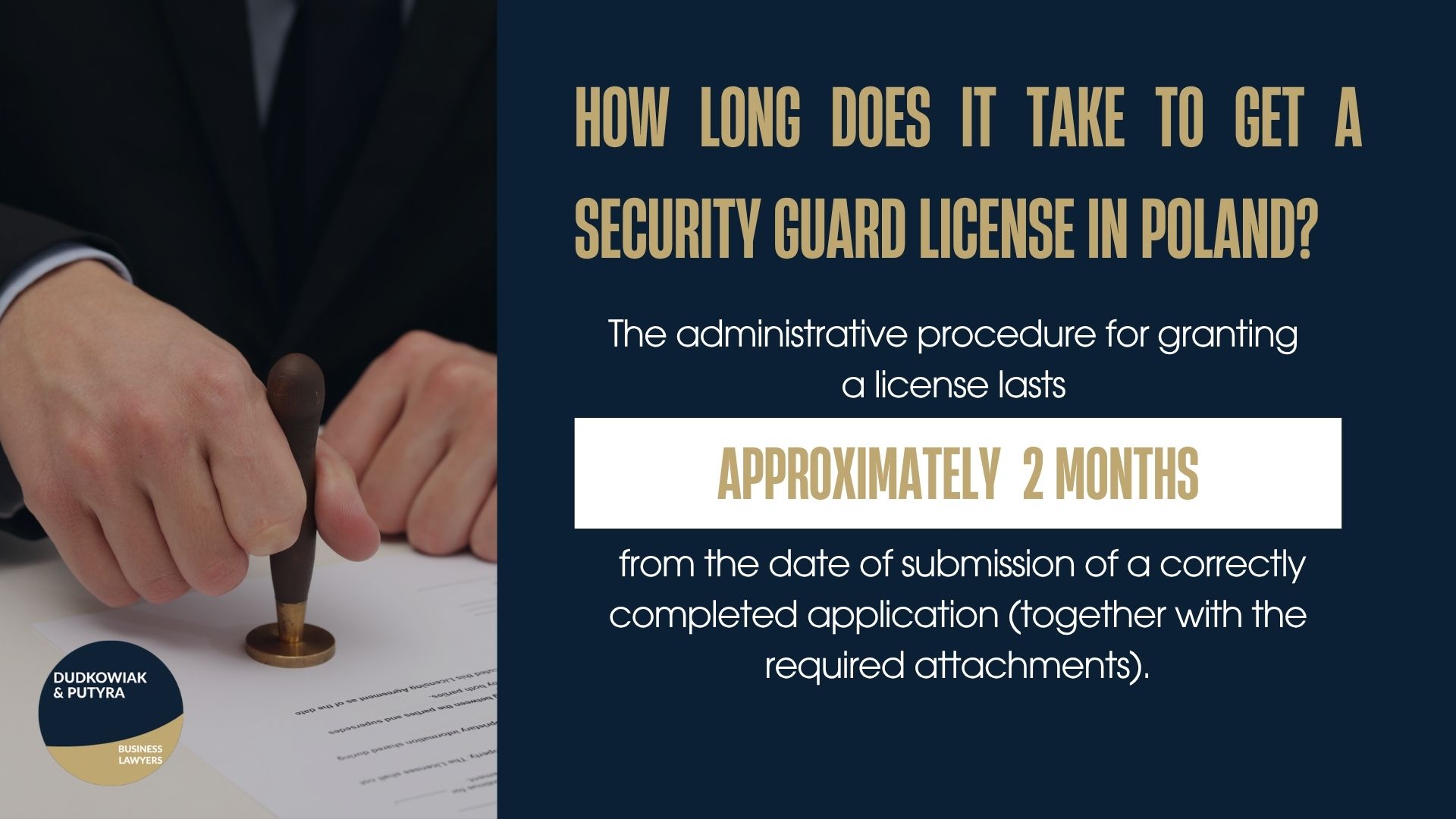
Does Technical Security Require a Security Guard License?
Not always.
A license is not required for Business activities in the field of technical security if they do not concern areas, facilities, and devices subject to mandatory protection and included as such in the records kept by the provincial governor. This is therefore a statutory exception to the rule of obtaining a license for security activities.
However, contact the competent government department to confirm your case.
What are the obligations of an entrepreneur conducting security activities?
An entrepreneur conducting such business activities is obliged to comply with specific obligations, regulated in detail by the Act.
The entrepreneur’s obligations result primarily from the nature of the license granted, their catalog is extensive, and the entrepreneur should ensure that they are properly fulfilled.
The entrepreneur’s obligations include, in particular:
- notifying the licensing authority (the minister responsible for internal affairs) of the commencement, suspension, and permanent cessation of business activity
- store employment records, certification, and training data;
- organizing and performing security by specialized armed security formations, in terms of the daily use of security personnel, their equipment and weapons, and the means of transport used, together with a detailed description of the security provided;
- keeping written contracts relating to the business activity and storing the concluded contracts and related documentation;
- supervising the performance of security tasks by security personnel;
- verifying the criminal records of security personnel;
- uniform identification of security personnel in a manner that allows for their identification;
- ensuring that security personnel wear clothing that allows for their identification and the identification of their employer in cases where they carry assigned firearms;
- mandatory civil liability insurance for damage caused in connection with the protection of persons and property.
In the context of the obligations of an entrepreneur conducting activities in the field of the protection of persons and property, it is extremely important to pay attention to deadlines.
In particular, the basic deadline determines the validity period of the obtained license.
Entrepreneurs must also remember about other key obligations – such as obtaining compulsory civil liability insurance, informing the licensing authority about any changes to the data specified in the license, and notifying the authority about the commencement, suspension, or permanent cessation of business activity.
The expiry of a concession results in the simultaneous loss of the possibility to legally conduct business activity and maintain contracts concluded with customers. In order to avoid this, it is necessary to meticulously check the validity of the concession and to properly fulfill the necessary obligations.
Revocation of a Security Guard License in Poland
A concession granted to an entrepreneur may be revoked by a decision of the licensing authority. The licensing authority is obliged to revoke the Security guard concession in the circumstances specified in the Act.
In such cases, there is no discretion in assessing the degree of non-compliance, as revocation is mandatory.
This occurs when:
- a final decision has been issued prohibiting the entrepreneur from conducting the business activity covered by the Security guard license;
- the entrepreneur has not commenced the activity covered by the concession within the prescribed period despite a request from the concession authority, or has permanently ceased to conduct the business activity covered by the concession.
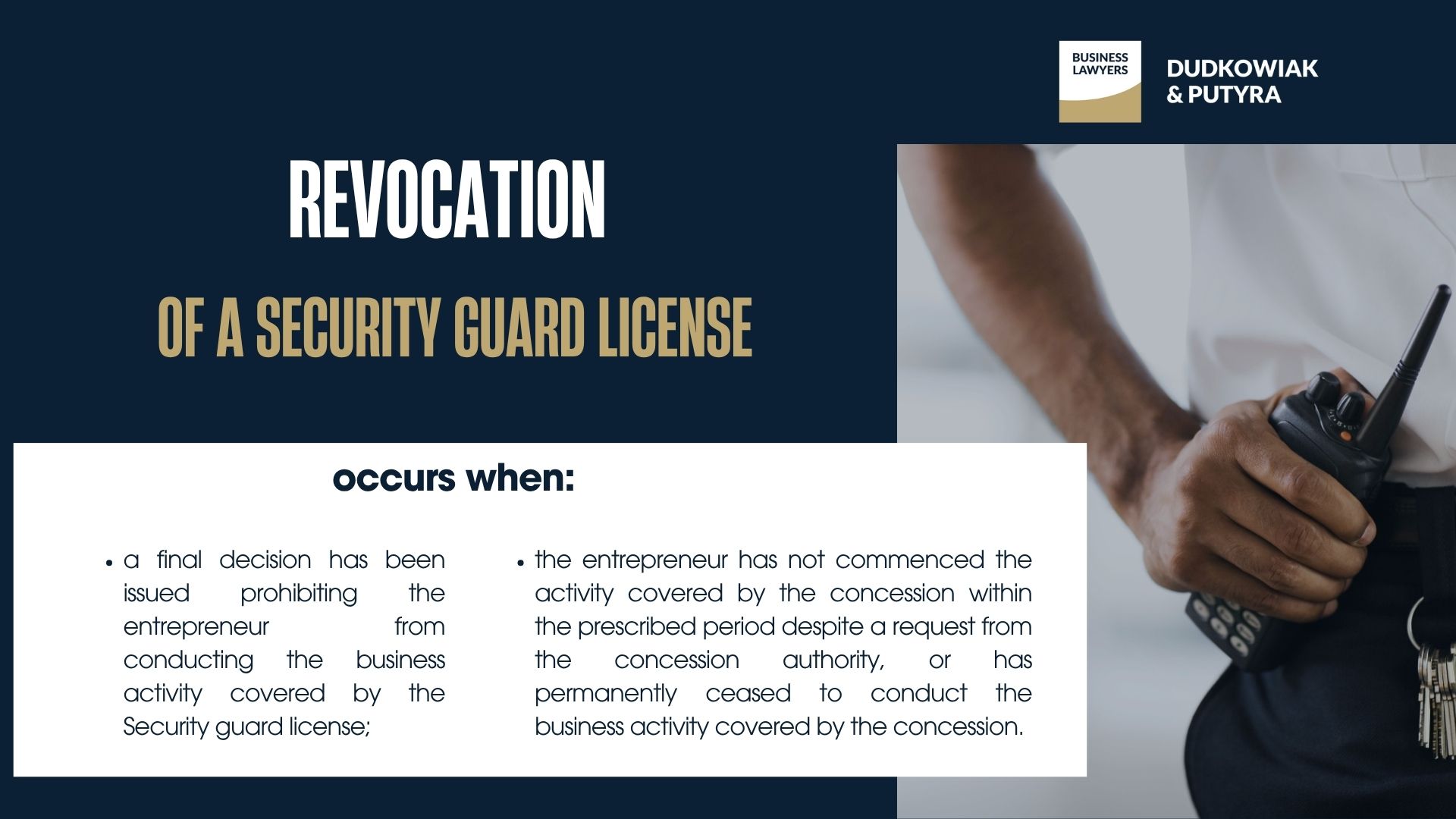
Changing the Scope of a Security Guard License in Poland
At the same time, in certain circumstances, apart from the possibility of revocation, depending on the individual case, the licensing authority also has the right to change the scope of the license granted.
Situations in which this is possible include those where:
- the entrepreneur has not, within the prescribed time limit, remedied the factual or legal situation that is inconsistent with the conditions specified in the license or with the regulations governing the economic activity covered by the concession;
- the entrepreneur grossly violates the conditions specified in the concession or other conditions for performing the concessioned economic activity, specified by law;
- the entrepreneur has not concluded the above-mentioned insurance contract.
- there is a threat to the defense and security of the state or the safety of citizens, or a threat to public order;
- the entrepreneur has not informed the licensing authority of a change in the data specified in the license;
- the entrepreneur is declared bankrupt or liquidated;
- the entrepreneur has allowed a person not included in the list of qualified physical security guards or qualified technical security guards to perform the tasks of a qualified physical security guard or qualified technical security guard;
- a decision has been issued declaring the inadmissibility of exercising rights attached to the entrepreneur’s shares or stocks, pursuant to the provisions of the Act of July 24, 2015, on the control of certain investments.
Security guard license in Poland – summary
The security guard license ensures legal compliance, professional standards, and protection of people and property in Poland. Whether you’re just starting out or applying for renewal, we can help you:
- Create your application,
- Collect the following documents,
- Track your new application status,
- Pay required application fees,
- Prepare for any appointment, training, or certification needs,
- Stay eligible for future work with licensed agencies.


